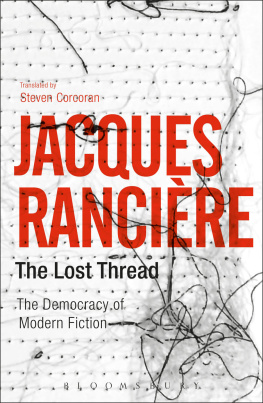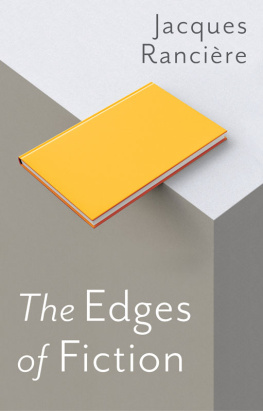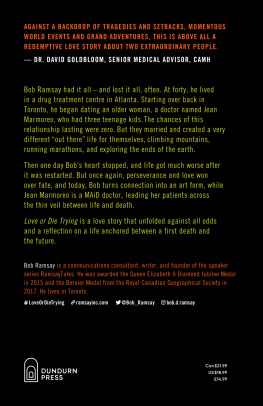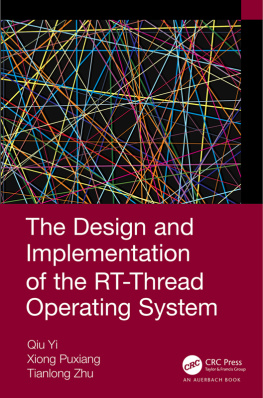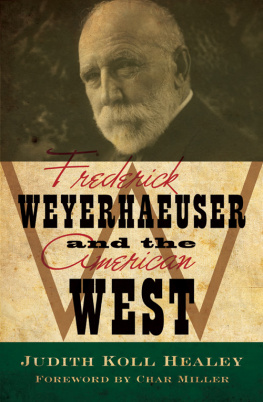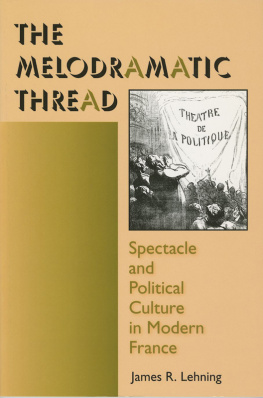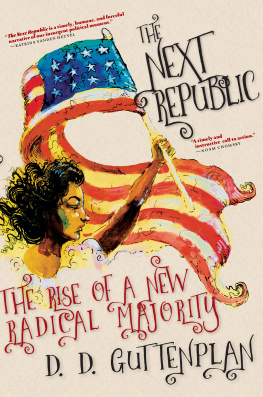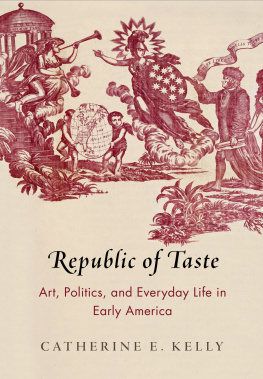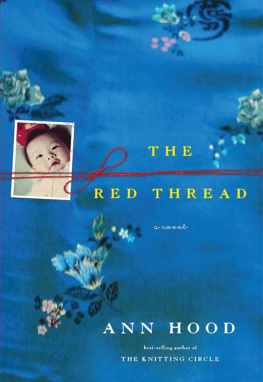Corcoran Steve - The lost thread: the democracy of modern fiction
Here you can read online Corcoran Steve - The lost thread: the democracy of modern fiction full text of the book (entire story) in english for free. Download pdf and epub, get meaning, cover and reviews about this ebook. City: London;UK;New York;NY;USA, year: 2017, publisher: Bloomsbury Publishing Plc;Bloomsbury Academic, genre: Science. Description of the work, (preface) as well as reviews are available. Best literature library LitArk.com created for fans of good reading and offers a wide selection of genres:
Romance novel
Science fiction
Adventure
Detective
Science
History
Home and family
Prose
Art
Politics
Computer
Non-fiction
Religion
Business
Children
Humor
Choose a favorite category and find really read worthwhile books. Enjoy immersion in the world of imagination, feel the emotions of the characters or learn something new for yourself, make an fascinating discovery.
- Book:The lost thread: the democracy of modern fiction
- Author:
- Publisher:Bloomsbury Publishing Plc;Bloomsbury Academic
- Genre:
- Year:2017
- City:London;UK;New York;NY;USA
- Rating:5 / 5
- Favourites:Add to favourites
- Your mark:
- 100
- 1
- 2
- 3
- 4
- 5
The lost thread: the democracy of modern fiction: summary, description and annotation
We offer to read an annotation, description, summary or preface (depends on what the author of the book "The lost thread: the democracy of modern fiction" wrote himself). If you haven't found the necessary information about the book — write in the comments, we will try to find it.
The lost thread: the democracy of modern fiction — read online for free the complete book (whole text) full work
Below is the text of the book, divided by pages. System saving the place of the last page read, allows you to conveniently read the book "The lost thread: the democracy of modern fiction" online for free, without having to search again every time where you left off. Put a bookmark, and you can go to the page where you finished reading at any time.
Font size:
Interval:
Bookmark:

THE LOST THREAD
ALSO AVAILABLE FROM BLOOMSBURY
Being and Event , Alain Badiou
Conditions , Alain Badiou
Infinite Thought , Alain Badiou
Logics of Worlds , Alain Badiou
Theoretical Writings , Alain Badiou
Theory of the Subject , Alain Badiou
From Communism to Capitalism , Michel Henry
Seeing the Invisible , Michel Henry
After Finitude , Quentin Meillassoux
Time for Revolution , Antonio Negri
The Five Senses , Michel Serres
Statues , Michel Serres
Rome , Michel Serres
Art and Fear , Paul Virilio
Negative Horizon , Paul Virilio
Althussers Lesson , Jacques Rancire
Chronicles of Consensual Times , Jacques Rancire
Dissensus , Jacques Rancire
Mallarm , Jacques Rancire
Politics of Aesthetics , Jacques Rancire
THE LOST THREAD
The Democracy of
Modern Fiction
BY JACQUES RANCIRE
Translated by Steven Corcoran
Bloomsbury Academic
An imprint of Bloomsbury Publishing Plc

CONTENTS
Jacques Rancires The Lost Thread explores the much-studied advent of modern fiction in the nineteenth century, its emergence from the hierarchy of genres and subjects characterizing pre-modern fiction. But while much ink has been spilt about this in twentieth-century modernist and structuralist discourse, Rancire argues that the essential anti-representational stakes of this transformation of literary fiction have been missed. What occurred was nothing less than a revolution in the ontology of fiction, the consistency and ramifications of which have gone largely misunderstood. The Lost Thread is thus an attempt to historicize what he sees this revolution as being about, that is, its specific dissensus, or untimeliness. In this, it continues the work he did in Aisthesis, which bears on the texture and logic of what he calls the aesthetic regime of art.
For Aristotle, something could be counted among the arts if it was endowed with a story of significance, possessing a beginning, a middle and an end; if it had an organic structure in which all the details were subordinated to the works overall perfection. But the new world of sensation and affect forced a rethink of this rationality. Gustave Flauberts literary realism marked a point of rupture with representational logic, as literature began to appear as a sensible mode in its own right: fiction came to manifest a growing disproportion between the preparatives for action and the unfolding of its action, going so far as to abolish any regulated succession from the immateriality of thought to the materiality of action. Flauberts novels, like those of Joseph Conrad and Virginia Woolf after him, undid the beautiful proportions that, since Aristotle, had defined fiction as a structure of rationality: the middle no longer appeared as a point of passage between a beginning and an end, but more as a milieu without meaning; details seemed to detach themselves from their internal organization; gaps opened up between effects and causes, depriving the tale of intelligibility through its temporal development; fiction lost its vertebral column, ceasing to be a body that stood by itself.
The new fiction came to be cluttered with a twofold excess. It became inundated with what the rationality of representationalist poetics had necessarily excluded. If fiction had necessarily entailed the interconnected causal unfolding of events in accordance with the rules of verisimilitude, then what it excluded, as Aristotle claimed, is the kath hekaston, or empirical succession of historical facts as they simply occur, without rhyme or reason, one after the other. This story about fictions manifest signs of change is an old one. If Rancire gives it a new twist, it is not in the manner of a Roland Barthes, by providing another interpretation of its non-manifest workings as part of a governing narrative structure. Instead, he takes into account what structuralist and modernist accounts of this transformation necessarily miss, namely the other side of this excess inundating the new fiction. To the succession of random events that simply happen one after the other corresponds the people who, unable to think at the level of the whole in order to distinguish themselves through grand actions or refined feelings, cannot do otherwise than simply have things happen to them. The Lost Thread turns precisely on the singular ways in which the new fiction reinscribes this outside of things and people encountered in the randomness of life within itself.
Conservative critics at the time deplored this cluttering of the space of fiction once reserved exclusively for the thought and refinement of the elite by insubordinate details and the prosaic concerns of ordinary everyday individuals. A century later Roland Barthes would interpret this disproportion between the immobilities of description and the dynamics of action in new literature as an attempt to recover the lost verisimilitude of Aristotelian representationalist poetics: he conceptualized this excess of superfluous details hindering narrative action as an effet de rel , or reality effect. Fiction is cast here not as a structure of rationality but instead as an imaginary realm somewhere between being and nothingness. But it is productive: the specificity of this fiction, as Barthes has it, consisted in an attempt to reify (market) reality, at naturalizing history in a capitalist society in which the old fixed modes and genres and hierarchies of subjects that defined pre-modern fiction no longer held. Rancire takes issue with both the conservative critic and the progressive intellectual, whose positions are by no means opposed; for the real issue, which forms the central task of this book, is to grasp this overcrowding of the space of pure fiction modern fiction as a dissensus with, and as a process of what I will call a creative destruction of, the representational regime of fiction. It is nothing less than the forging of a new rationality of fiction itself under what conditions and how this is done are the subject matter of this book.
Historicizing this dissensus of modern fiction grasping it as a transformative event in the very structure of rationality of fiction itself means grasping the new subjects and the new objects, the new problems and paradoxes, that it brings forth. But doing this means dismissing a twofold obfuscation of this event: on the one hand, the conservative critics view of the cluttering of the space of fiction as a mere series of random events without backbone, a simple pile of facts. The critic dubs this invasion of a space and time, now too cluttered by the prosaic concerns of ordinary individuals to allow the distinguished elites the room to develop their grand actions and unfold their fine feelings, as follows: it is democracy in literature. But understanding this nomination pejoratively, he is nostalgic for the eternal time of the old order and fails to see the consistency of the revolution in the ontology of fiction underway. As Rancire reminds us, realist fiction in the manner of Flaubert or Conrad is for this critic simply a monster without order, a random succession of empirical facts without causal linkages, of details that signal an equality without rationality. It is viewed as a simple destruction of the old order, a fruitless ruination to be cast aside in the restoration of the proper representational order of fiction. As suggested above, the progressive intellectual, on the other hand, views this destruction, this proliferation of descriptive excess ruining representation, as a sort of stopgap to a loss of order. It is an attempt at reinventing representational effects by inundating the narrative structure with excessive description of a paradoxical usefulness: descriptions of objects, for example, whose sheer purposelessness indicate the unconditional realist of their being there . The usefulness of the figures and images go the new fiction, then, is precisely to signal the eternity of the new (bourgeois) reality, its historical permanence. For this intellectual, realist fiction thus maintains verisimilitude, against the background of a simultaneously destructive dimension, since it works to recode mores, demystify taboos, eradicate inherited psychic structures, and so on. However, its unidimensional and closed temporality as is implied in its forging of a reality effect means it is unable to make the creative leap outside representation toward authentic artistic modernity, understood as a signifying process possessing its own autonomous logic. Barthes subscribes to the modernist vision of a historical event that breaks through History, separating out a time before and a time after. And this modernism links together a historical process of political emancipation and a historical process of the autonomization of artistic practices. Understanding representation as simple figuration or resemblance, for him the task, at once political and literary, was thus to sweep away all parasitic images of the real and bring about the purification of narrative structure. As Rancire magnificently shows, despite their differences, Barthess position thereby rejoins that of the conservative critic. For both encounter the scandal of this excess that they insist on keeping out. Both thus necessarily maintain an emphasis, in their own ways, on the fictional time of causeeffect linkages, of action, which, as Rancire argues, is the very core of representational poetics.
Font size:
Interval:
Bookmark:
Similar books «The lost thread: the democracy of modern fiction»
Look at similar books to The lost thread: the democracy of modern fiction. We have selected literature similar in name and meaning in the hope of providing readers with more options to find new, interesting, not yet read works.
Discussion, reviews of the book The lost thread: the democracy of modern fiction and just readers' own opinions. Leave your comments, write what you think about the work, its meaning or the main characters. Specify what exactly you liked and what you didn't like, and why you think so.

